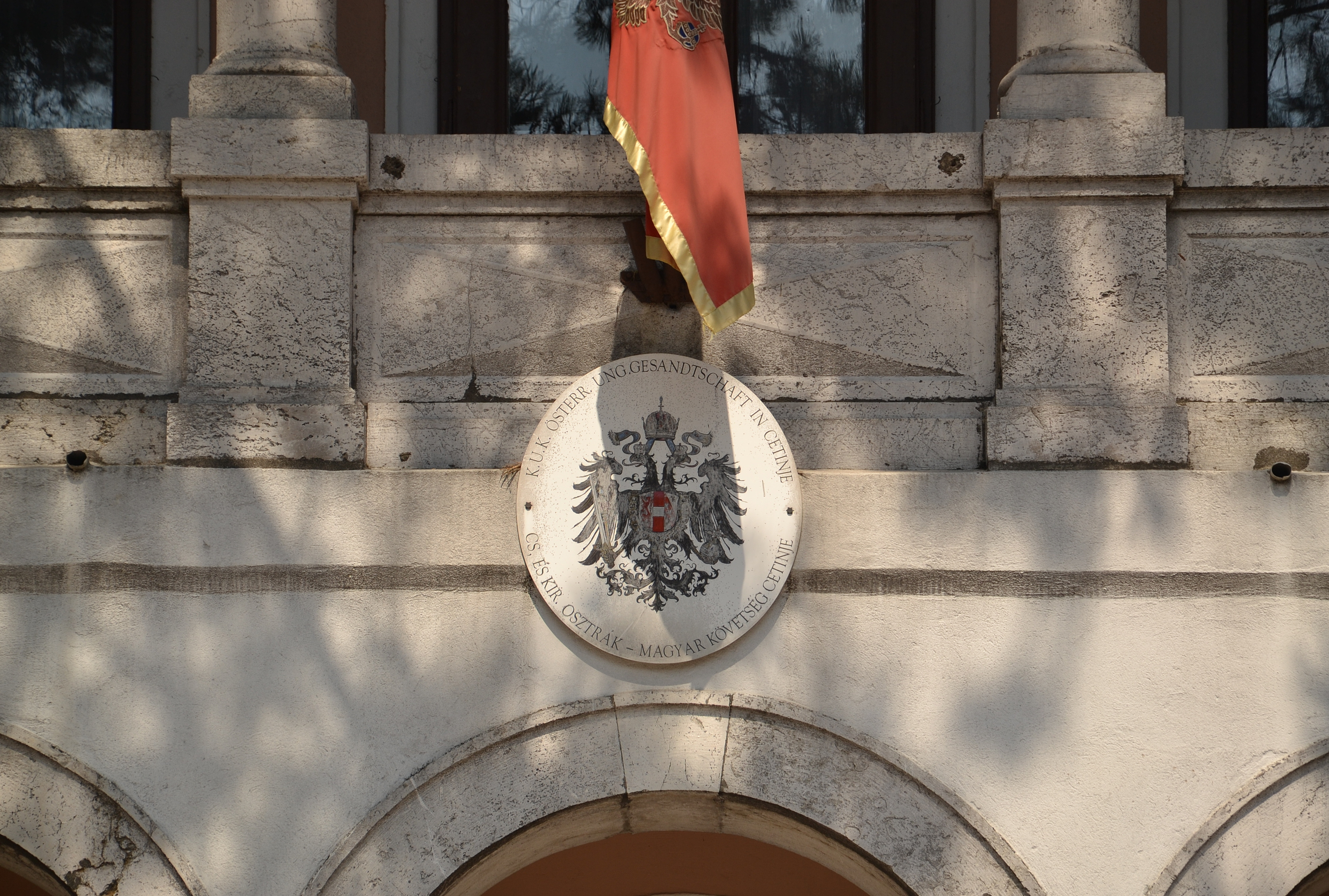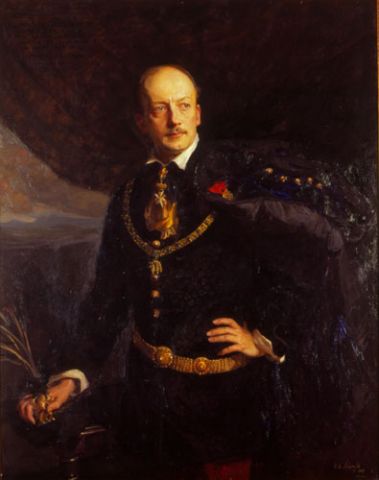|
János Forgách
Count János Forgách de Ghymes et Gács (german: Johann Graf Forgách von Ghymes und Gács) (24 October 1870 – 25 September 1935), was an Austro-Hungarian diplomat of Hungarian origin who played a prominent role during World War I and in particular the July Crisis. Life Born in Gács (now Halič) on 24 October 1870 into a prominent Hungarian noble family as son of Count Antal Forgách de Ghymes et Gács (1819–1885), who had been of the few Hungarian magnates taking the side of Austria in 1848 and served as Section Chief in the Imperial Foreign Ministry in the 1850s. In 1908, he married Gabriella Lovassy de Szakál (1889–1972) in Budapest and the couple had three children. In October 1905, Count Forgách received his first major posting as minister at Rio de Janeiro. In June 1907, he transferred to Belgrade where he played a significant role during the Bosnian crisis of 1908. However, he discredited himself the following year during the so-called Friedjung Process ... [...More Info...] [...Related Items...] OR: [Wikipedia] [Google] [Baidu] |
Austro-Hungarian Ambassadors
This is a list of diplomatic missions of Austria-Hungary from the formation of the Dual Monarchy in 1867 until it was dissolved in 1918. For a background to the diplomatic service of Austria-Hungary, including the types of diplomatic representation, see Austro-Hungarian Foreign Service. History Austria-Hungary had 110 non-honorary consulates and 364 honorary consulates, for a total of 474, in pre-war 1914. This number declined as a result of World War I; consulates in Italy and the U.S. respectively closed in 1915 and 1917, making up the majority of consulates closed in those years. The number of consulates declined to 307 upon the declaration of war in 1914. This declined to 273 in 1915, 227 in 1916, and 193 in 1917. In 1918, upon the end of the empire, Austria-Hungary had 13 consulates-general, 18 other consulates, a consular agency, and a vice-consulate.Agstner, Rudolf. ''Austria (-Hungary) and Its Consulates in the United States of America Since 1820''. LIT Verlag Münster, 2 ... [...More Info...] [...Related Items...] OR: [Wikipedia] [Google] [Baidu] |
Count Leopold Berchtold
Leopold Anton Johann Sigismund Josef Korsinus Ferdinand Graf Berchtold von und zu Ungarschitz, Frättling und Püllütz ( hu, Gróf Berchtold Lipót, cs, Leopold hrabě Berchtold z Uherčic) (18 April 1863 – 21 November 1942) was an Austro-Hungarian politician, diplomat and statesman who served as Imperial Foreign Minister at the outbreak of World War I. Life Career Born in Vienna on 18 April 1863 into a wealthy noble family that owned lands in Moravia and Hungary, he was reputed to be one of Austria-Hungary's richest men. Tutored at home, he later studied law and joined the Austro-Hungarian foreign service in 1893. In the same year, he married Countess Ferdinanda Károlyi (1868–1955), the daughter of one of the richest aristocrats in Hungary, in Budapest. He subsequently served at the embassies in Paris (1894), London (1899) and St. Petersburg (1903). In December 1906, Count Berchtold was appointed as the successor of Count Lexa von Aehrenthal as Ambassador to Russi ... [...More Info...] [...Related Items...] OR: [Wikipedia] [Google] [Baidu] |
Austrian Diplomats
Austrian may refer to: * Austrians, someone from Austria or of Austrian descent ** Someone who is considered an Austrian citizen, see Austrian nationality law * Austrian German dialect * Something associated with the country Austria, for example: ** Austria-Hungary ** Austrian Airlines (AUA) ** Austrian cuisine ** Austrian Empire ** Austrian monarchy ** Austrian German (language/dialects) ** Austrian literature ** Austrian nationality law ** Austrian Service Abroad ** Music of Austria ** Austrian School of Economics * Economists of the Austrian school of economic thought * The Austrian Attack variation of the Pirc Defence chess opening. See also * * * Austria (other) * Australian (other) * L'Autrichienne (other) is the feminine form of the French word , meaning "The Austrian". It may refer to: *A derogatory nickname for Queen Marie Antoinette of France *L'Autrichienne (film), ''L'Autrichienne'' (film), a 1990 French film on Marie Antoinette wit ... [...More Info...] [...Related Items...] OR: [Wikipedia] [Google] [Baidu] |
Diplomats From Austria-Hungary
A diplomat (from grc, δίπλωμα; romanized ''diploma'') is a person appointed by a state or an intergovernmental institution such as the United Nations or the European Union to conduct diplomacy with one or more other states or international organizations. The main functions of diplomats are: representation and protection of the interests and nationals of the sending state; initiation and facilitation of strategic agreements; treaties and conventions; promotion of information; trade and commerce; technology; and friendly relations. Seasoned diplomats of international repute are used in international organizations (for example, the United Nations, the world's largest diplomatic forum) as well as multinational companies for their experience in management and negotiating skills. Diplomats are members of foreign services and diplomatic corps of various nations of the world. The sending state is required to get the consent of the receiving state for a person proposed to serv ... [...More Info...] [...Related Items...] OR: [Wikipedia] [Google] [Baidu] |
Austro-Hungarian Diplomats Of World War I
Austria-Hungary, often referred to as the Austro-Hungarian Empire,, the Dual Monarchy, or Austria, was a constitutional monarchy and great power in Central Europe between 1867 and 1918. It was formed with the Austro-Hungarian Compromise of 1867 in the aftermath of the Austro-Prussian War and was dissolved shortly after its defeat in the First World War. Austria-Hungary was ruled by the House of Habsburg and constituted the last phase in the constitutional evolution of the Habsburg monarchy. It was a multinational state and one of Europe's major powers at the time. Austria-Hungary was geographically the second-largest country in Europe after the Russian Empire, at and the third-most populous (after Russia and the German Empire). The Empire built up the fourth-largest machine building industry in the world, after the United States, Germany and the United Kingdom. Austria-Hungary also became the world's third-largest manufacturer and exporter of electric home appliances, el ... [...More Info...] [...Related Items...] OR: [Wikipedia] [Google] [Baidu] |
19th-century Austrian People
The 19th (nineteenth) century began on 1 January 1801 ( MDCCCI), and ended on 31 December 1900 ( MCM). The 19th century was the ninth century of the 2nd millennium. The 19th century was characterized by vast social upheaval. Slavery was abolished in much of Europe and the Americas. The First Industrial Revolution, though it began in the late 18th century, expanding beyond its British homeland for the first time during this century, particularly remaking the economies and societies of the Low Countries, the Rhineland, Northern Italy, and the Northeastern United States. A few decades later, the Second Industrial Revolution led to ever more massive urbanization and much higher levels of productivity, profit, and prosperity, a pattern that continued into the 20th century. The Islamic gunpowder empires fell into decline and European imperialism brought much of South Asia, Southeast Asia, and almost all of Africa under colonial rule. It was also marked by the collapse of the la ... [...More Info...] [...Related Items...] OR: [Wikipedia] [Google] [Baidu] |
19th-century Hungarian People
The 19th (nineteenth) century began on 1 January 1801 ( MDCCCI), and ended on 31 December 1900 ( MCM). The 19th century was the ninth century of the 2nd millennium. The 19th century was characterized by vast social upheaval. Slavery was abolished in much of Europe and the Americas. The First Industrial Revolution, though it began in the late 18th century, expanding beyond its British homeland for the first time during this century, particularly remaking the economies and societies of the Low Countries, the Rhineland, Northern Italy, and the Northeastern United States. A few decades later, the Second Industrial Revolution led to ever more massive urbanization and much higher levels of productivity, profit, and prosperity, a pattern that continued into the 20th century. The Islamic gunpowder empires fell into decline and European imperialism brought much of South Asia, Southeast Asia, and almost all of Africa under colonial rule. It was also marked by the collapse of the large S ... [...More Info...] [...Related Items...] OR: [Wikipedia] [Google] [Baidu] |
1935 Deaths
Events January * January 7 – Italian premier Benito Mussolini and French Foreign Minister Pierre Laval conclude an agreement, in which each power agrees not to oppose the other's colonial claims. * January 12 – Amelia Earhart becomes the first person to successfully complete a solo flight from Hawaii to California, a distance of 2,408 miles. * January 13 – A plebiscite in the Territory of the Saar Basin shows that 90.3% of those voting wish to join Germany. * January 24 – The first canned beer is sold in Richmond, Virginia, United States, by Gottfried Krueger Brewing Company. February * February 6 – Parker Brothers begins selling the board game Monopoly in the United States. * February 13 – Richard Hauptmann is convicted and sentenced to death for the kidnapping and murder of Charles Lindbergh Jr. in the United States. * February 15 – The discovery and clinical development of Prontosil, the first broadly effective antibiotic, is published in a se ... [...More Info...] [...Related Items...] OR: [Wikipedia] [Google] [Baidu] |
1870 Births
Year 187 ( CLXXXVII) was a common year starting on Sunday (link will display the full calendar) of the Julian calendar. At the time, it was known as the Year of the Consulship of Quintius and Aelianus (or, less frequently, year 940 '' Ab urbe condita''). The denomination 187 for this year has been used since the early medieval period, when the Anno Domini calendar era became the prevalent method in Europe for naming years. Events By place Roman Empire * Septimius Severus marries Julia Domna (age 17), a Syrian princess, at Lugdunum (modern-day Lyon). She is the youngest daughter of high-priest Julius Bassianus – a descendant of the Royal House of Emesa. Her elder sister is Julia Maesa. * Clodius Albinus defeats the Chatti, a highly organized German tribe that controlled the area that includes the Black Forest. By topic Religion * Olympianus succeeds Pertinax as bishop of Byzantium (until 198). Births * Cao Pi, Chinese emperor of the Cao Wei state (d. 226) * ... [...More Info...] [...Related Items...] OR: [Wikipedia] [Google] [Baidu] |
Ukrainian People's Republic
The Ukrainian People's Republic (UPR), or Ukrainian National Republic (UNR), was a country in Eastern Europe that existed between 1917 and 1920. It was declared following the February Revolution in Russia by the First Universal. In March 1917, the National Congress in Kyiv elected the Central Council composed of socialist parties on the same principles as throughout the rest of the Russian Republic. The republic's autonomy was recognized by the Russian Provisional Government. Following the October Revolution, it proclaimed its independence from the Russian Republic on 22 January 1918 by the Fourth Universal. During its short existence, the republic went through several political transformations – from the socialist-leaning republic headed by the Central Council of Ukraine with its general secretariat to the socialist republic led by the Directorate and by Symon Petliura. Between April and December 1918, the socialist authority of the Ukrainian People's Republic was sus ... [...More Info...] [...Related Items...] OR: [Wikipedia] [Google] [Baidu] |





